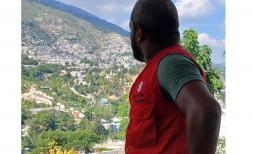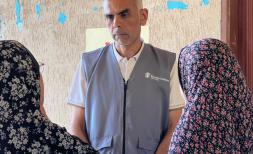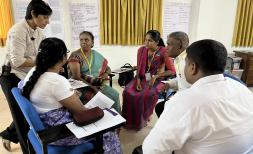“Nutrition makes people healthy and happy”: Our 5 Top Highlights from the Tokyo Nutrition for Growth Summit
Adan*, 18 months, holds a sachet of RUSF nutrition supplement provided to children suffering from Moderate Acute Malnutrition.
Last week, after a year-long delay, the much-awaited and anticipated Tokyo Nutrition for Growth (N4G) Summit finally took place virtually. Even though the COVID-19 pandemic delayed the summit by more than what’s considered fashionably late, it also underscored the critical, cross-cutting, and catalytic nature of good nutrition in all aspects of health and society, from building back better lives to achieving all 17 Sustainable development goals. In other words, nutrition is fundamental to everything, and as the Prime Minister of Japan, Kishida Fumio, described it: “nutrition makes people healthy and happy,” and that message was heard loud and clear.
Throughout the two-day summit, a stream of governments, donors, international agencies, businesses, and civil society took to the ‘virtual’ podium to announce a host of financial, policy, programmatic and impact pledges. We have done the hard job of whittling down the jam-packed summit, with its hundred or so speeches, into our Top 5 highlights:
1. Commitment galore: If we had to sum up the summit in one word, it would be commitments. With other crises competing for attention, it is all the more impressive that the Tokyo Nutrition for Growth Summit raised more than US$27 billion. It generated 331 nutrition commitments, including a staggering 680 defined goals made by 156 stakeholders across 66 countries. These commitments will provide a much-needed cash injection in ending the global injustice that is malnutrition in all its forms. Despite the wealth of knowledge and solutions, rates of malnutrition are at emergency levels. Today millions are on the brink of famine. In 2020, 149 million children were stunted (too short), and 45 million children were wasted (too thin). And, today, around 3 billion people – that’s one in three people in the world – are unable to afford a healthy, nutritious diet. The commitments made by Governments and other stakeholders at N4G are the first step to help turn the tide on these tragic figures. The N4G compact, signed by 212 stakeholders, including 64 countries, reveals that the global action and collaboration needed to end malnutrition is there. And together, we can and must reach the goal.
2. Accountability matters: The Government of Japan has shown strong leadership of the summit by engaging civil society as both partners and targets on the N4G summit, providing them with various opportunities to input into the summit’s foundations, structure, and approach from day one. As a result, Civil Society actors were in front of and behind the scenes – with more than a quarter of the commitments made at the summit coming from them. Additionally, UN bodies and charities alike took to the floor to share ideas and insights on integrating nutrition into Universal Health Coverage, promoting healthy diets and building sustainable food systems, and addressing malnutrition effectively in fragile and conflict-affected states. What’s more, the Summit saw the creation of the new Nutrition Accountability Framework (NAF). This independent platform, overseen by the Global Nutrition Report, will help ensure commitments are SMART (specific, measurable, achievable, relevant and time-bound) and will also track how successfully these commitments are actually implemented.
3. Save the Children’s impact: After spending the last two years calling on Country Governments to put forward transformative and life-saving financial and policy pledges at N4G, it was only fair that we do the exact same. And walk the talk. Save the Children International CEO Inger Ashing announced our financial commitment of half a billion to tackle malnutrition. Through this bold investment, we will ensure that 105 million children, in over 40 countries, receive support to prevent and treat undernutrition. We will also work to reach over 14 million children and their families with livelihood support, including through cash and voucher assistance. We will continue to support the poorest and most vulnerable children, working with them to build the futures they deserve, and we will continue to hold ourselves and others, who made commitments, to account.
4. Young people are watching and waiting – don't let them down: Undeniably, the youth today deserve to be heard and acknowledged at global political gatherings. So, it was great to see not just one but nine of the Scaling Up Nutrition (SUN) Civil Society Network (CSN) Youth Leaders for Nutrition take part in the N4G Summit. They detailed the catastrophic impact of malnutrition on children’s lives, how it is limiting their potential to survive, learn and thrive, and trapping them in a vicious cycle of poverty. It was inspiring to hear about the work they will undertake to hold governments to account for their N4G pledges and ensure that young voices are heard at the local, national, and global levels. We were particularly delighted to see them present their own set of commitments, which included establishing national youth mobilisation networks in their respective countries as well as creating forums for the most marginalised children to engage with decision-makers. We will continue to push for their voices to be included and amplified!
5. See you in Paris: The next host nation of the summit will be France, with the N4G summit being hosted in Paris in 2024. By then, we will only be six years away from the SDG deadline of 2030, and as such, the summit will be one of the last final pushes we have for concerted global action around nutrition. We will work hard to support these efforts and look forward to working with them!







